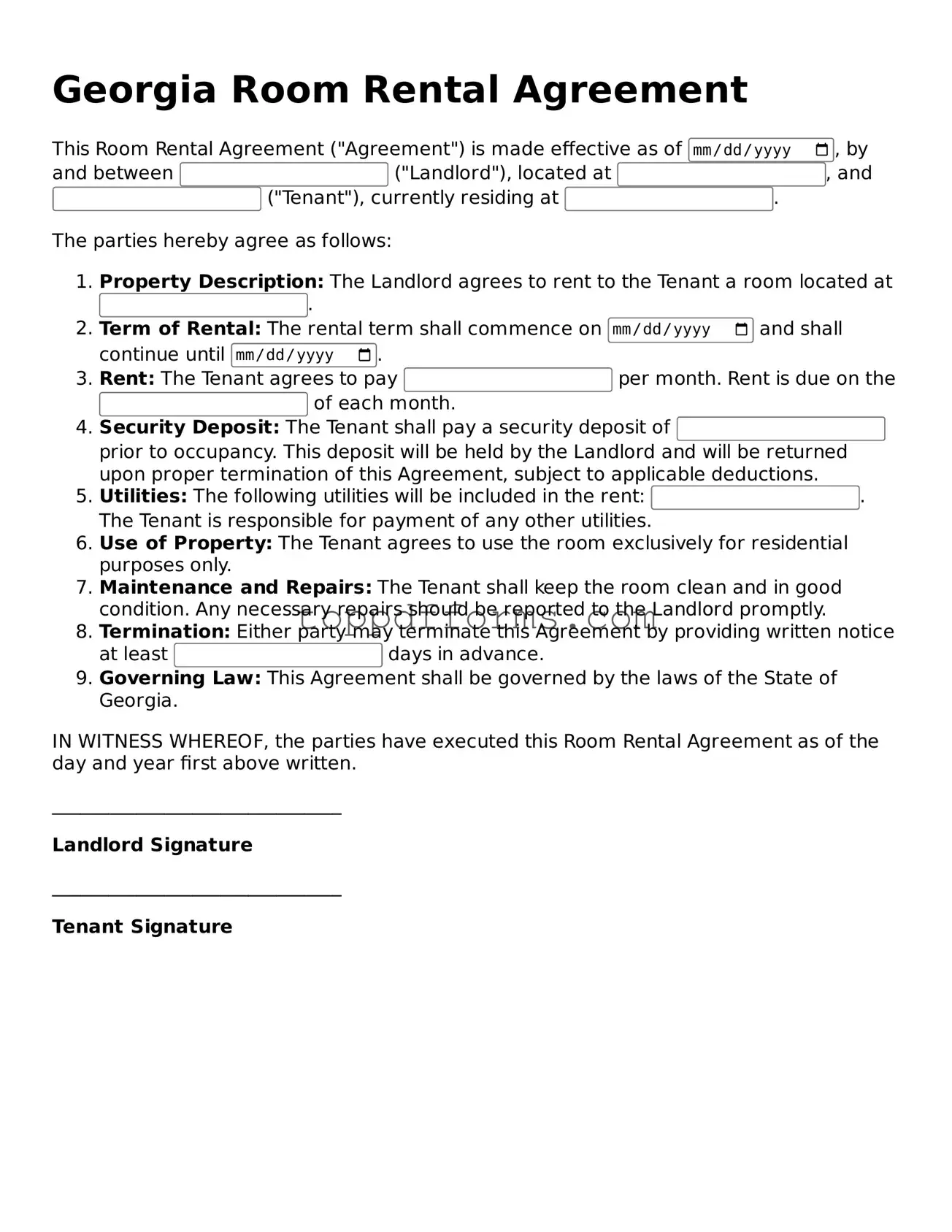Room Rental Agreement Document for Georgia State
Things You Should Know About This Form
What is the Georgia Room Rental Agreement form?
The Georgia Room Rental Agreement form is a legal document used to outline the terms and conditions between a landlord and a tenant regarding the rental of a room. This agreement specifies important details such as the rental amount, payment due dates, security deposits, and the duration of the rental period. It serves to protect both parties by clearly defining their rights and responsibilities.
Who should use the Georgia Room Rental Agreement?
This form is ideal for landlords renting out individual rooms in a property, as well as tenants seeking to rent a room. Whether you are a homeowner looking to rent out a spare room or a tenant searching for a room to rent, this agreement helps ensure that both parties understand the terms of the arrangement. It is essential for establishing clear communication and expectations.
What should I include in the Room Rental Agreement?
When completing the Room Rental Agreement, include details such as the names of the landlord and tenant, the address of the rental property, the monthly rent amount, the security deposit, and the lease duration. Additionally, outline any house rules, maintenance responsibilities, and procedures for ending the agreement. Clarity on these points helps prevent misunderstandings later on.
Is the Georgia Room Rental Agreement legally binding?
Yes, once both parties sign the Georgia Room Rental Agreement, it becomes a legally binding contract. This means that both the landlord and tenant are required to adhere to the terms outlined in the agreement. If either party fails to comply, the other party may have legal grounds to seek enforcement or remedies. Always ensure that the agreement is filled out completely and accurately before signing.
PDF Overview
| Fact Name | Description |
|---|---|
| Governing Law | The Georgia Room Rental Agreement is governed by the Georgia Residential Landlord-Tenant Act, which outlines the rights and responsibilities of landlords and tenants in the state. |
| Purpose | This form serves to establish the terms of rental agreements between landlords and tenants, ensuring clarity regarding payment, duration, and responsibilities. |
| Security Deposit | Georgia law allows landlords to collect a security deposit, which typically cannot exceed one month's rent, to cover potential damages or unpaid rent. |
| Duration | The agreement can specify a fixed term or be month-to-month, providing flexibility based on the needs of both parties. |
| Termination Notice | Under Georgia law, landlords must provide a written notice of at least 60 days for lease terminations, while tenants are required to give at least 30 days' notice. |
Common mistakes
Filling out the Georgia Room Rental Agreement form can seem straightforward, but many people make common mistakes that can lead to misunderstandings or legal issues. One frequent error is failing to provide accurate personal information. When tenants do not include their full names or correct contact details, it can create complications in communication and enforcement of the agreement.
Another mistake often made is neglecting to read the entire document before signing. Many individuals rush through the process, missing critical terms and conditions that could affect their rights and responsibilities. Understanding the rental terms, including payment schedules and maintenance obligations, is essential to avoid disputes later on.
Many people also overlook the importance of specifying the rental period. Not indicating the start and end dates of the rental agreement can lead to confusion about when the lease begins and ends. This oversight can result in unintended extensions or premature terminations of the rental arrangement.
Additionally, some tenants fail to clarify the security deposit details. The agreement should outline the amount of the deposit, the conditions for its return, and any deductions that may apply. Without this information, tenants may find themselves at a disadvantage when it comes to recovering their deposit at the end of the rental period.
Lastly, individuals often forget to include the signatures of all parties involved. A rental agreement is not legally binding unless it is signed by both the landlord and the tenant. Without these signatures, the agreement may not hold up in court, leaving both parties vulnerable to potential disputes.
Other Common State-specific Room Rental Agreement Forms
Roommate Agreement Pdf - Clarifies how disputes will be resolved, whether through mediation or court.
To facilitate a smooth divorce process, it is essential for both parties to complete the Florida Divorce Settlement Agreement form, which outlines crucial details regarding asset division and responsibilities. You can obtain this form from floridaformspdf.com/printable-divorce-settlement-agreement-form, ensuring that all terms are clearly defined and legally enforceable, thereby minimizing potential misunderstandings.
Room Rent Agreement Format - Includes provisions for termination of the agreement by either party.
